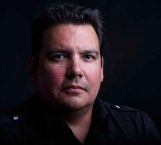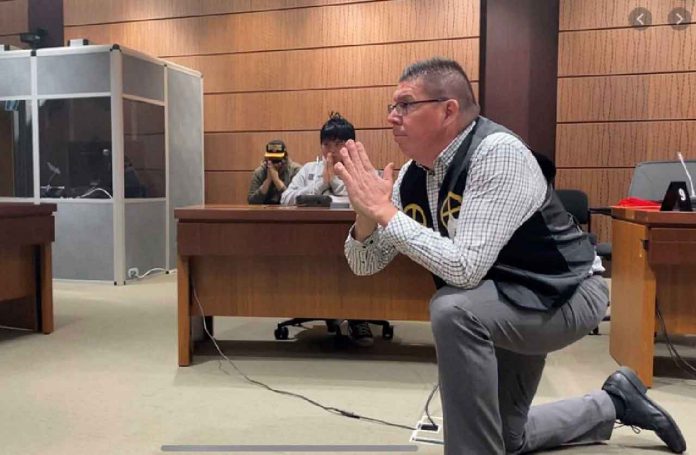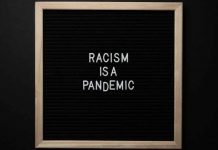Indigenous Services Minister Marc Miller played host Friday to an “emergency” virtual meeting on racism in Canada’s health-care system.
It offered an opportunity for Miller and Crown-Indigenous Relations Minister Carolyn Bennett to hear how Indigenous peoples experience health care, and what solutions professionals might offer as a remedy.
On Sept. 28, 37-year-old Atikamekw mother and wife Joyce Echaquan died in hospital in Joliette, Que. Prior to her death, she livestreamed on social media facility staff using racist slurs and mocking her while denying pleas for help.
“Everyone should feel safe when visiting a hospital or physician’s office,” Miller said, after joining Bennett to meet with Echaquan’s family. “(It is) therefore important to remind everyone that during this pandemic, keeping Indigenous communities safe, Indigenous people safe and healthy, is my utmost priority.”
At that meeting, Echaquan’s son got down on one knee, begging the ministers for justice.
“Carolyn and I should have got down on our knees and begged them for forgiveness for a system that failed them,” Miller said.
The province of Quebec has fired the staff members who mocked Echaquan and has launched an inquiry into the incident. Premier François Legault, however, denies systemic racism exists in Quebec’s health-care system.
I — and literally hundreds of others, including Prime Minister Justin Trudeau — have clearly identified Canada’s health-care system as plagued with systemic racism.
On Friday, Manitoba First Nations elder Sadie North, 72, said she was questioned about alcohol use during a stay at the Grace Hospital in September. She was there for cellulitis, a bacterial infection, on her leg.
Anyone who doesn’t understand Indigenous peoples are discriminated against when entering a hospital, health-care unit, or undergoing medical care simply will never see it. With just the evidence publicly available, you either know gravity exists or not.
So, as Indigenous peoples literally beg for systemic racism to be addressed in Canada’s health-care system, here comes elected officials arguing it’s due to some “bad apples,” so we need an inquiry or meeting where Indigenous peoples have to prove racism exists.
Meanwhile, Indigenous peoples need the health-care system more than ever.
On Friday, the Assembly of Manitoba Chiefs announced 105 new COVID-19 cases among First Nations people in the past week, raising the total to 284 (115 on-reserve, 169 off-reserve) since the novel coronavirus pandemic began.
Also reported was the first death of a First Nations person due to COVID-19: an elder “over the age of 70” (no further details were released).
Over that same period, Manitoba reported 725 new cases.
This means roughly one of out every seven new cases in the province is a First Nations person, or 14 per cent — higher than the 10.5 per cent proportion First Nations make up of Manitoba’s population.
And the pandemic hasn’t yet hit more than 50 of Manitoba’s 63 First Nations.
If the province kept track of cases in the Métis population (there exists no official tallies, unfortunately), we might see a major reason Manitoba took the lead in proportional national cases this week relates to a high Indigenous population.
It’s been well-reported Indigenous peoples are at higher risk to COVID-19 due to poverty, poor housing and overcrowding, and a lack of infrastructure — and now we have fairly solid proof in Manitoba’s numbers.
This means more and more Indigenous peoples will be interacting with the health-care system over the next few weeks.
(To test my theory, I masked up and walked into Winnipeg’s Health Sciences Centre on Friday. I saw Indigenous peoples out-numbered non-Indigenous peoples (visually, anyways) about three to one. I wonder what their experiences will be?)
So, while elected officials offer excuses, inquiries and hold “emergency” meetings, it’s time for all of us to be the solution.
Whenever you witness racist comments or actions, do something about it. No excuses. This is particularly true in emergency rooms, hospitals, and medical facilities, but in workplaces, homes, and online, too.
It’s crucial the community doesn’t repeat what happened to Joyce Echaquan but also remember the racism leading to Brian Sinclair’s death at HSC in 2008 isn’t that far away. It’s on all of us to support one another during the most important health event of our lifetime.
If we focus attention, resources, and fix the problem of system racism in the health-care system to “flatten the curve” of COVID-19 in Indigenous communities it will flatten the curve in Manitoba.
It’s that simple.
We didn’t even need an inquiry or emergency meeting to come up with a solution.
 Niigaan Sinclair
Niigaan Sinclair
Originally appeared in the Winnipeg Free Press in October 2020. Republished with the permission of the author.
The views, opinions, and positions expressed by all columnists and contributors are the author’s alone. They do not inherently or expressly reflect the views, opinions and/or positions of NetNewsLedger.







